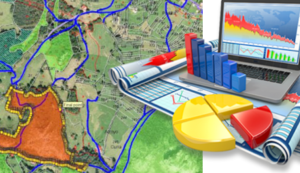
Specialization course in Geoprocessing
Main goal
Qualify human resources, especially in training for local/regional economic and social development, to use geoprocessing technologies, as well as train professionals in knowledge and use of geoprocessing techniques and their applications in various areas of knowledge.
Specific objectives
- Meet the demand of public entities and social organizations that use spatial information for local/regional economic and social development.
- Disseminate the area of geoprocessing between professionals from related areas, providing a complement to their academic background.
- Opportunity to update and requalify professionals who need to master technologies involving the use of space information.
- make available to society, professionals able to resolve issues in the area of geoprocessing and aware of their responsibilities;
- Disseminate the main existing geotechnologies.
Desired professional profile:
It is expected that the student concluding course has a capacity of:
- Plan acquisition, treatment, analysis and conversion actions of georeferenced data, selecting appropriate techniques and tools;
- Participate in multidisciplinary teams that work with spatial information for local/regional economic and social development;
- Identify types, properties and functions of spatial views;
- Collect, process and analyze different data types to represent it spatially in digital medium;
- Use information technologies, including its spatial dimension;
- Understand, use and criticize the applications of Geographic Information Systems (GIS), their analysis potential and their modeling;
- Assist decision making based on spatial analysis of natural and anthropic phenomena;
- Innovate in the solutions and measures adopted aiming at local/regional economic and social development through geotechnologies;
- Participate, criticize and transform territorial relationships in the society in which he/she lives.
Target Audience:
Professionals from public agencies and social organizations working in local/regional economic and social development functions that can involve the use of geospatial information. This audience includes professionals from planning, housing, transportation, environment, agriculture, infrastructure, mining, epidemiology, civil defense, public safety, tourism, sanitation, among others.
Teaching Methodology
The course will be offered in the distance and/or face -to -face modality, with a workload of 540 hours, for 24 months (2 years), as well as a course completion work. All disciplines will use free software, free installation.
The course is organized in five axes in which the 18 modules (30 -hour each) distributed in the following thematic axes, in addition to course completion project.
Introduction
Virtual Learning Environment (AVA) (30h)
Axis 1 - Acquiring and viewing spatial data
- Spatial information and geotechnology applications (30h)
- Cartography and Geovisualization (30h)
- Spatial location and topography systems (30h)
- Introduction to programming for geoprocessing (30h)
Axis 2 - Data to spatial interpretation
- Space Databases (30h)
- Remote Sensing (30h)
- Technopolitics and Territory (30h)
- Geotechnologies and Social Cartographies (30h)
Axis 3 - Geospatial Data Analysis
- Spatial analysis of polygons (30 h)
- Spatial analysis of points (30h)
- Interpolation and Geostatistics (30h)
- Spatial analysis of matrix data (30h)
- Network Spatial Analysis (30h)
- Space-time data analysis (30h)
Axis 4 - Applying the knowledge and skills
- Webgis (30h)
- Practice of analysis and interpretation of socioeconomic data (30h)
- Practice of analysis and interpretation of environmental data (30h)
- Evaluation of Course Conclusion Paper (TCC)
Phone: (00) 0000-0000
E-mail: coordenacao.egeo@ufabc.edu.br
Phone: (00) 0000-0000
E-mail: coordenacao.egeo@ufabc.edu.br




